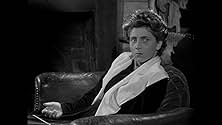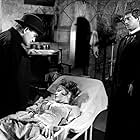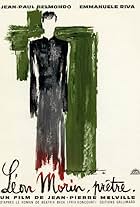In occupied France, an elderly man and his niece are forced to give shelter to a German army lieutenant who seemingly loves their country and culture.In occupied France, an elderly man and his niece are forced to give shelter to a German army lieutenant who seemingly loves their country and culture.In occupied France, an elderly man and his niece are forced to give shelter to a German army lieutenant who seemingly loves their country and culture.
- La nièce
- (as Nicole Stephane)
- La fiancée
- (as Ami Aaroe)
- L'Allemand
- (as Fromm)
- L'Allemand
- (as Vernier)
- L'Allemand
- (as Schmiedel)
- Director
- Writers
- All cast & crew
- Production, box office & more at IMDbPro
Storyline
Did you know
- TriviaWhen the author of the original novel, Vercors, objected to Melville adapting his book without obtaining the rights, the filmmaker made him a deal. The filmmaker would go ahead and make the film without permission, and when it was complete, Vercors would arrange a screening of it for 24 former Resistance members. If even one of the 24 objected to the film, he, Melville, would personally burn the negative in front of Vercors' own eyes. When Vercors arranged the screening, he assumed that only 26 people would be present: himself, Melville and the 24-member "jury." However, much to Vercors' chagrin, Melville "stacked the deck" by instructing his publicist to invite many prominent critics and literary figures, including André Malraux and Jean Cocteau (whose novel Melville would later adapt into the film The Terrible Children (1950)), although Melville feigned innocence in the matter. Of the 24 "jury" members, one dropped out just before the screening, and the editor of the French newspaper Le Figaro was recruited as a replacement. When the film was over, 23 voted in favor of the film and only one against: the Le Figaro editor. However, when Vercors discovered that the man had voted against the film not because of the work itself, but because his vanity was offended at being a last-minute substitute, Vercors discounted his vote, and the film was saved.
- Quotes
Werner von Ebrennac: There's a lovely fairy tale that I've read, that you're read, that everyone has read. I don't know if the title is the same in your country. We call it, "Das Tier und die Schöne", "Beauty and the Beast". Poor Beauty, she is at the mercy of the Beast, powerless and imprisoned. She is subjected to his implacable, heavy presence all day long. Beauty is proud, dignified, she has become hard. But the Beast is better than he seems. He doesn't have the finest manners. He is tactless, brutal. He seems vulgar next to the refined Beauty. But he has a heart. Yes, a soul which aspires to higher things. If Beauty wished it so...
- ConnectionsFeatured in Melville Steps Out of the Shadows (2010)
The condition the main characters find themselves in seems on one hand absurd and existential, and on the other, to reveal such a timeless and menacing aspect of all war - the desire for one nation to essentially eliminate another. For most of the film, a German officer talks to a Frenchman and his niece about his life, his taste in the arts, and professes his admiration for French culture, all while they sit in stony silence, trapped in their own living room, but passively resisting his overtures to connect with them on a human level. His eyes are eventually opened to his country's plans and what they are really doing though. The novel the film was based on was written in occupied France and published secretly in 1942, which is a marvel on its own to think about.
The film by no means forgives the Nazis (and even includes a Treblinka reference the novel didn't have to emphasize that the Holocaust was known by at least some German officers), but it also shows that decent men exist in any enemy. In this terrible situation, it thus sets up fascinating questions: Should the Frenchman and his daughter engage with this man? Should he attempt to disobey his orders? Or does war simply crush those possibilities out of existence? That scene where the officer sees the monuments in Paris extolling the military triumphs of the past, for leaders and causes which ran their course and faded into oblivion, is brilliant. One sees the courage of the Resistance in these two quiet people in their home, the appeal to humanity under extraordinary circumstances, and the cruelty and senselessness of it all.
- gbill-74877
- Dec 6, 2019
- Permalink
- How long is The Silence of the Sea?Powered by Alexa
Details
- Release date
- Country of origin
- Languages
- Also known as
- Tisina mora
- Filming locations
- Production companies
- See more company credits at IMDbPro
- Runtime1 hour 27 minutes
- Color
- Aspect ratio
- 1.33 : 1
Contribute to this page























